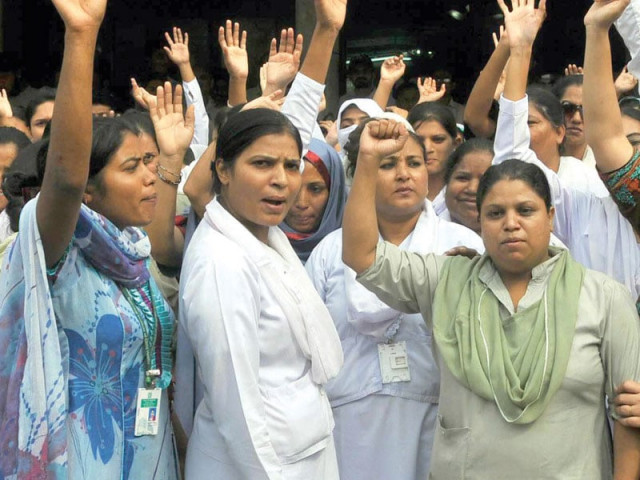Sindh’s health care: Nursing a grudge over long-untended needs
Nurses threaten to hold rallies for better pay and conditions in province-wide strike.

They take care of us when we are at our most vulnerable but now they want someone to tend to their needs. A heavy workload exacerbated by low pay has nurses up in arms in Mirpurkhas, Nawabshah, Sukkur, Hyderabad and Khairpur with the protest threatening to spread to Karachi.
So far nurses in Karachi have distanced themselves from the protest but as Aijaz Ali Kaleri of the Provincial Nurses Association puts it: “If our demands for better pay and working conditions are not seriously considered by the end of this week we will be forced to think about shutting down all our services in Sindh.”
Topping their list of demands is an increase in the monthly stipend and salary for trainee and staff nurses. In Sindh the stipend for a nurse in training is Rs1,525 a month – much less than what nurses under the federal government are paid: Rs6,000.
“After securing a post in the public sector, a Grade 16 staff nurse draws about Rs20,000 - Rs1,525 is nothing [for a nurse in training],” says an official with the Civil Hospital, Mirpurkhas (CHM) requesting anonymity. “How is one supposed to eat and live in this amount let alone meet other essential needs?” This is why one of the demands is that nurses in training should be paid Rs7,000 over their four-year course and staff nurses should be given a minimum Rs10,000 increase in line with recent increments announced for doctors.
The president for the Provincial Nurses Association in Sukkur, Irshad Pathan, also stressed on the need to motivate nurses with benefits if they are working in the difficult areas of emergency care or in the rural areas. The same should apply to nurses who have eschewed working in private and have devoted their entire energies to their government job.
Another sticking point is the workload. “International standards put one nurse to four patients,” said the association’s Kaleri. “Here we have one nurse to 50 patients!” Why would nurses want to work in Pakistan for such small amounts when they can go abroad and make at least Rs200,000, he argues.
Training to become a nurse is not easy. A general nurse has to complete three years of training and then one year of specialised training. A nurse midwife and community midwife are required one year of training each while lady health visitors (LHV) 2 and LHV 3 are each mandated two years of training. Pupil midwives need to complete 18 months of training.
Vacancies
Despite the abundance of nurses in training there don’t seem to be enough qualified nurses at work as hundreds of posts, including some top-level positions, remain empty. These vacancies put extra work on the existing workforce. Kaleri adds that there is a major shortage of the special nurses who are trained and qualified to assist surgeons in the operation theatre.
There are about 600 vacancies right now in the Sindh health department. Kaleri says the positions are slowly being filled. “About 1,000 posts were filled last year and we have announced 100 urban seats for which tests and interviews are being held on January 27.”
After the selection process, letters will be issued in February. Approval to fill another 96 seats for Grade 17 lies with the finance ministry, Kaleri says. They include the posts of clinical instructor, nursing instructor and head nurse. They should be filled by the end of February.
Examination results
Results for the 2011 annual examinations conducted by the Sindh Nurses Examination Board are scheduled to be announced on January 28. About 9,540 candidates appeared for the test, including those applying for general nursing, nurse midwife, community midwife and other specialist courses. There are a total of 69 institutes responsible for training nurses in Sindh. Of these, 37 are in the private sector, 29 in the public sector and three are army medical institutions. In 2010, 7,972 candidates (4,157 males, 2,817 females) passed the exam.
Published in The Express Tribune, January 26th, 2012.



















COMMENTS
Comments are moderated and generally will be posted if they are on-topic and not abusive.
For more information, please see our Comments FAQ